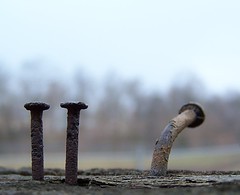Ramadi Unity Parade Marks Key Event in Iraqi Reconciliation
By David Mays
Special to American Forces Press Service
WASHINGTON, Oct. 26, 2007 – A remarkable parade in Iraq’s Anbar province, openly attended by citizens from all walks of life, demonstrates that Iraqi reconciliation efforts are working, a coalition commander said today.
“Out in al Anbar, which you know has been a difficult area about six months ago: a total change,” Army Brig. Gen. Dave Phillips told online journalists and bloggers during a conference call from Baghdad. “When they say there is an awakening, I think that's almost an understatement.”
Phillips, deputy commanding general for the Civilian Police Assistance Training Team, said he personally attended an event earlier this week that proved the awakening movement encouraged by Sunni sheiks is working.
“This past Tuesday, I went out to Ramadi,” the general explained. “The Iraqis came up with a concept of a Unity Day parade. Never in my wildest imagination did I ever think Ramadi would host a parade which would be led with a band playing and then also young Iraqi boy scouts marching with flags, young Iraqi girl scouts marching with flags, followed by the fire department, the national police, the regular police, ambulances. Never dreamed I would see something like that.”
Increased security in Iraqi communities allows such open celebrations to take place, Phillips explained. To that end, the general said, he and his team have helped hire more than 13,000 new Iraqi police officers just in the past two months.
“We have more people signing up than what we actually have ability to hire,” Phillips explained. “And when I say ‘we,’ I'm referring to the Iraqis.”
Tomorrow, 450 Iraqi police officers will begin 10 weeks of specialized training led by Italy’s fabled Carabinieri force, the general said.
“The national police of Iraq are structured very similar to the Carabinieri in Italy,” Phillips explained. “The Carabinieri have nationwide authority; so do the (Iraqi) national police. They can deploy anywhere in the country, and they're a high-end police force that can transition very rapidly to almost light infantry. And so we saw the parallels there.”
In addition to the thousands of police applicants, thousands more Iraqis are volunteering to patrol their own neighborhoods as “concerned local citizens” the general said.
“Most of them bring their own weapons with them,” Phillips said. “They will work with the Iraqi police, and they will be responsible for guarding a block or a corner or some area. And they basically are auxiliaries. They help the police. They can't make arrests, but they are there as eyes and ears on the street, and they provide information.”
So far, more than 50,000 concerned local citizens have offered their services in and around Fallujah, Muqdadiyah, and Diyala, the general said.
“Some are paid. A vast majority are not paid,” Phillips said. “They're doing it because they want to see a difference in their community.”
It’s clear, the general said, that Iraqi citizens are making a difference in their community when they are able to openly celebrate as they did this week in Ramadi.
“When I sat there at the Ramadi parade, that evening I contacted my wife and told her that for one of the first times in a long time, I was very optimistic,” he said. “In the past, I was cautiously optimistic, but what I saw at Ramadi, to me, that was one of those days to where you realized you are witnessing something extremely special.”


